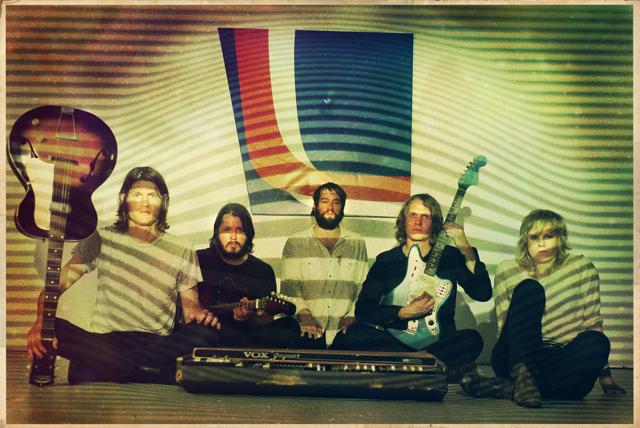The Black Angels’ music has roots in styles of 40 years ago: the band is often called “psychedelic rock,” a tag it doesn’t shy from. But the Black Angels view the genre more as a means of reaching a transcendental state of sorts.
“Psychedelic music has been around since the dawn of time,” says Alex Maas (lead vocals, bass, organ, guitar, percussion). He cites the image of prehistoric man beating bones against cave walls and hearing the resulting reverberation. “Psychedelic rock,” he notes, “began here in Austin, Texas, with the 13th Floor Elevators.” Maas also mentions the notorious band/cult Ya Ho Wa 13; he believes they “brought psychedelic music back to that caveman style.”
Those psychedelic styles are enjoying unprecedented popularity. Maas reflects on the reasons why people are responding to this music now, in a way that they didn't five to 10 years ago. “Music is cyclical; it always comes back around. And the political climate now is, in some ways, the same as it was in the ‘60s: uneasiness and lack of knowledge of where we are as a nation. And the Internet is driving knowledge of different kinds of music.”
The Black Angels imbue their particularly modern approach with some carefully selected instruments. Onstage and in the studio, they use vintage keyboards, including the Vox Continental organ. Though Maas admits that “it costs us a lot of money to keep those things up and running when we’re on tour,” the instruments’ distinctive sound and feel are critical to the band’s sonic stew. That philosophy is consistent, he says, “all the way down to the guitar pedals, guitars … every instrument that we use.” The vintage equipment sounds better, and, he laughs, “besides that, they look really cool. And they even smell different.”
The Grey Eagle show will be the band’s second Asheville visit within five months; the Black Angels’ “Dropout Boogie Tour” came to town last November, supporting Vancouver-based Black Mountain for an enthusiastically received, packed-house show. “All our shows in Asheville are magical for some reason,” Maas says.
In a bit of a departure from the band’s earlier discs, Phosphene Dream features more concisely structured songs. Maas says that those compositions “started long, but we whittled them down for the record. And when we play them live,” he chuckles, “we expand them again.”
Those songs were collaboratively developed in the studio, not ahead of time. “We went into the studio with [producer] Dave Sardy, and would actually make a song out of the sounds we were creating." Maas says the band was pleased to have in Sardy a “sixth mind to bounce ideas off of, someone outside the band.” Another deliberate and significant departure from earlier Black Angels material is Phosphene Dream’s more out-front mixing of the vocals.
Contrasting with the droning, 16-minute-plus songs included on the group’s 2006 debut Passover and 2008’s Directions to See a Ghost, the latest disc’s single, "Telephone," is a straightforward pop song that could have fit nicely on Lenny Kaye’s seminal 1972 Nuggets compilation. “That was a conscious decision,” Maas admits. “We definitely wanted to reach more people.” The song smartly retains the Black Angels style, effectively drawing new listeners into the world of the band’s music. Maas observes that this approach also “opened up the future of what we could do as a band.”
Another thing that the band does — both in the studio and onstage — is switch around on instruments. While doing so adds visual interest to the concerts, it’s also a key part of the Black Angels’ sound, exploiting the subtle shifts in texture resulting from different people playing different instruments. But it didn’t start out that way.
“In the beginning,” Maas recalls, “it was a case of, ‘You came up with that bass line, and no one can play it quite like you, and we don’t have time to teach it, so you play it.’” He reflects on the band’s songwriting style: “We write songs so quickly that it’s often better for that person to stick with the instrument that they wrote their part on.”
When those songs are being developed, there’s a tried-and-true process. It starts with the song’s “feel,” Maas says. “The feel leads to imagery, and the imagery leads to lyrical content: ‘How does this song make me feel? Where are we?’” He compares the process to scoring a film. “Rarely do we sit down and say, ‘We’re going to write a song about, say, ice cream.’”
— Bill Kopp is an Asheville-based music journalist whose features and reviews can be found at http://blog.billkopp.com and http://musoscribe.com.
who: The Black Angels with Suuns
where: The Grey Eagle
when: Saturday, April 2 (9 p.m. $12/$15. thegreyeagle.com)




Before you comment
The comments section is here to provide a platform for civil dialogue on the issues we face together as a local community. Xpress is committed to offering this platform for all voices, but when the tone of the discussion gets nasty or strays off topic, we believe many people choose not to participate. Xpress editors are determined to moderate comments to ensure a constructive interchange is maintained. All comments judged not to be in keeping with the spirit of civil discourse will be removed and repeat violators will be banned. See here for our terms of service. Thank you for being part of this effort to promote respectful discussion.